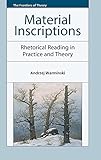Material Inscriptions : Rhetorical Reading in Practice and Theory / Andrzej Warminski.
Material type: TextSeries: The Frontiers of Theory : FRTHPublisher: Edinburgh : Edinburgh University Press, [2022]Copyright date: ©2013Description: 1 online resource (248 p.)Content type:
TextSeries: The Frontiers of Theory : FRTHPublisher: Edinburgh : Edinburgh University Press, [2022]Copyright date: ©2013Description: 1 online resource (248 p.)Content type: - 9780748681228
- 9780748681235
- 801.95 23
- P301 .W37 2013
- P301 .W37 2013
- online - DeGruyter
| Item type | Current library | Call number | URL | Status | Notes | Barcode | |
|---|---|---|---|---|---|---|---|
 eBook
eBook
|
Biblioteca "Angelicum" Pont. Univ. S.Tommaso d'Aquino Nuvola online | online - DeGruyter (Browse shelf(Opens below)) | Online access | Not for loan (Accesso limitato) | Accesso per gli utenti autorizzati / Access for authorized users | (dgr)9780748681235 |
Browsing Biblioteca "Angelicum" Pont. Univ. S.Tommaso d'Aquino shelves, Shelving location: Nuvola online Close shelf browser (Hides shelf browser)

|

|

|

|

|

|

|
||
| online - DeGruyter The Ethics of Peace and War / | online - DeGruyter Derrida and Other Animals : The Boundaries of the Human / | online - DeGruyter Reading Literature Historically : Drama and Poetry from Chaucer to the Reformation / | online - DeGruyter Material Inscriptions : Rhetorical Reading in Practice and Theory / | online - DeGruyter Ideology, Rhetoric, Aesthetics : For de Man / | online - DeGruyter Letter Writing Among Poets : From William Wordsworth to Elizabeth Bishop / | online - DeGruyter Transatlantic Transcendentalism : Coleridge, Emerson, and Nature / |
Frontmatter -- Contents -- Series Editor’s Preface -- Author’s Preface -- Acknowledgements -- 1. Facing Language: Wordsworth’s First Poetic Spirits (“Blest Babe,” “Drowned Man,” “Blind Beggar”) -- 2. Aesthetic Ideology and Material Inscription: On Hegel’s Aesthetics and Keats’s Urn -- 3. Spectre Shapes: “The Body of Descartes?” -- 4. Reading for Example: A Metaphor in Nietzsche’s Birth of Tragedy -- 5. Towards a Fabulous Reading: Nietzsche’s “On Truth and Lie in the Extramoral Sense” -- 6. Reading Over Endless Histories: Henry James’s “The Altar of the Dead” -- 7. Ending Up/Taking Back (with Two Postscripts on Paul de Man’s Historical Materialism) -- 8. The Future Past of Literary Theory -- Appendix: Interview: “Deconstruction at Yale” -- Index
restricted access online access with authorization star
http://purl.org/coar/access_right/c_16ec
A new work of scholarship in the 'practice' of rhetorical readingThis monograph provides readings of literary and philosophical texts that work through the rhetoric of tropes to the material inscription at the origin of these texts. The book focuses on the practice and pedagogical value of rhetorical reading. Its readings follow an itinerary from poetic texts (such as those by Wordsworth and Keats) through theoretical or philosophical texts (by Descartes and Nietzsche) to narrative fiction (by Henry James). The book also contains two essays on Paul de Man and literary theory and an interview on the topic of Deconstruction at Yale." All three of these latter texts are explicitly about the inescapable function and importance of the rhetoric of tropes for any critical reading or literary study worthy of the name.As Andrzej Warminski demonstrates, ‘rhetorical reading’ is a species of ‘deconstructive reading’—in the full ‘de Manian’ sense—but one that, rather than harkening back to a past over and done with, would open the texts to a different future.Key Features:New readings of texts by Wordsworth, Keats, Descartes, Nietzsche, and Henry JamesEssays and an interview on Paul de Man and ‘Deconstruction at Yale’Reflects on and exemplifies the pedagogical value of ‘de Manian’ rhetorical readingAttempts to open a future for 'deconstructive' or 'de Manian' reading"
Mode of access: Internet via World Wide Web.
In English.
Description based on online resource; title from PDF title page (publisher's Web site, viewed 29. Jun 2022)


